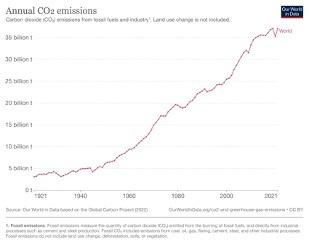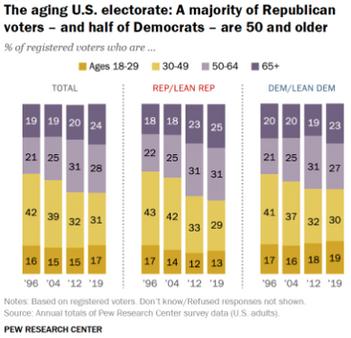
4 minute read
Voting for the Earth: How Politics Impacts the Planet
By Jay Kirby
Environmental concerns pervade public discourse like never before, with wildfires, floods and ‘an increase in world average temperature by 2100 [between] 1.4 and 5.8 degrees celsius’ becoming increasingly pressing issues. (McMicheal et al, 2006) It should therefore be startling that governmental climate action appears so inefficient and inadequate, with global fossil fuel usage being higher than ever in 2021 at 37.12 billion tonnes (as seen below)! (Ritchie et al, 2020) It’s time to ask: why is politics not leading to the necessary reforms, and could modern voting patterns demonstrate why the solutions to Earth’s problems seem so far away?
Advertisement

If this is indeed true, then perhaps an analysis of voting demographics age patterns in particular may provide a clearer indication of how politics and sustainability interact. In the 2020 presidential election, Biden’s votes were split almost exactly between under and over 50 year olds, with Trump’s being only slightly skewed towards more elderly supporters. But from whom are these votes coming? More than 50% of the registered voting body in America were aged 50 and above, likely due to a slowly declining birth rate and technological advancements improving life expectancy; this would imply that issues more popular with elder generations may be more widely represented in voting patterns. The issue is compounded by a significantly lower proportion of young people choosing to vote one study, for instance, noted how only 37% of 18-24 year olds voted in the 2005 general election compared to 61% of the general population. (Marsh et al, 2007) Explanations for this phenomenon include ‘that they are relatively apathetic, alienated or that they may fail to see the relevance of a political agenda that they may regard as incorporating few of their interests.’ (Furlong and Cartmel, 2012)
It is no secret that climate change has become a highly politicised issue. No example could illustrate this better than Republican president Trump’s decision to pull the US from the Paris Agreement in 2017 before Biden’s administration reversed this in 2021. Interestingly enough, however, polls tend to display the variance between Democrat and Republican opinions on the issue as somewhat minimal that is, the two are not so dissimilar in terms of their faith in the scientific consensus, for example. The divide is far more prominent between the more extreme ends of the political spectrum, with 79% of liberals believing that human activity is responsible for climate change compared to just 15% of conservatives (Funk and Kennedy, 2016) Overall, 49% of participating Americans were found to hold this particular belief, suggesting that votes for one party or the other based solely on this issue would largely cancel each other out.
As might be expected, this has significant ramifications on climate change. Prevailing public opinion would tell you that the average young person is more likely to be actively concerned about fossil fuel usage and the importance of recycling than more senior citizens and social scientists would largely agree, with issues such as the environment, nuclear power and 3rd world growth dominating polls of 18-30 year olds. (Inglehart, 1977) As research into medicine and the like continues to improve life expectancies in the decades to come, the number of elderly votes will only increase, while young votes are set to dwindle yet further As a result, climate change could become severely underrepresented in politics
An issue arises, however, in that the US political system is dominated heavily by just two parties, with 93% of all votes in 2020 leaning towards one of these options; since these have drastic and opposing views on a wide variety of topics besides climate change, we cannot necessarily assume that, for example, all votes for Biden’s manifesto were based on a desire to fight climate change. (Pew Research Center, 2020) On this side of the pond, meanwhile, there is significantly more room for independent candidacy, meaning that the performance of the Green Party could be taken as evidence of how climate-based voters are choosing to act. The evidence thereby does not appear promising; this party currently holds just a single seat in Parliament, suggesting that in December 2019, issues such as the Brexit deal were considered more pertinent by the British public than climate change
References:
Herein lies the issue when voting, the slow burner of fossil fuels (no pun intended) will almost certainly be pushed into the background in the face of a cost-ofliving crisis. Rather than claiming that voters simply do not care about the planet, we may instead note that our short term worries and pressures often dwarf long-term consequences; this could be extended to climate policy as well, as governments standing for reelection in four years may find costly and disruptive measures with no immediate, visible effect hard to justify.
So what can be done to amend this vicious cycle of perpetual procrastination? First off, the decline in young voting is still a serious issue, and it’s one with many proposed solutions, including encouragement throughout education (Kawashima-Ginsberg and Kiesa, 2019) and personalised messaging. (Burgess et al, 2000) In addition, as so often appears to be the case, the messaging and information surrounding climate change continues to require improvement. A population who fully understand the nature and consequences of, for example, the proposed Willow Project will be far more likely to vote with sustainability in mind let’s give the Earth a vote.
• McMichael, Woodruff and Hales “Climate change and human health: present and future risks ” ScienceDirect, March 2006 Available at: https://www sciencedirect com/science/article/pii/S0140673606680793?casa token=LpJ6Q x-QZMAAAAA:jYJ0FpiE3X-vtJB YmhuY2ek-I ilQrX2AvrkYD9DNnf4fG0ZoiY5AFP8GgMIyatQGFKuhA Ritchie, Roser and Rosado “CO2 emissions” Our World In Data, 2020 Available at: https://ourworldindata org/co2-emissions?utm source=tricity%20news&utm campaign=tricity%20news%3A%20outbound&utm medium=referral#citation
• Funk and Kennedy “The Politics of Climate Change in the United States ” October 2016 Available at: https://d1wqtxts1xzle7 cloudfront net/55450880/The Politics of Climate Change in the United Stateslibre pdf?1515147795=&response-contentdisposition=inline%3B+filename%3DSCIENCE POLITICS and BACKWARDNESS.pdf&Expires=1678207438&Signature=H1cywLI7nOkIzXkzOZXlX0S5gHIyNZzbGpsEciKWT GPY7mKHKj8jC bKDT3gKDrLfcnysT yzVyRrs8iUfEyHTfwj57~BSomFNY58-RgmNfGqYB4iOOr31gxsYRXbyIq6O08ynkjm7Z7gcz3oT-2JN8v1pPmPL~IRYJJR~XXujcfjroUw2UozuLOKqBXFmEZXCnRE3Rn9~5a3EK1YsMKNzSqZLyuvjgFRJzgSVMgyTgFg4WtHvoJnYXkNrpYCSUOJPq9UWjrYUh9qntHMzlDHmUFHGB36lhgDz1u2p~QPOAvqNUVS8qiImGXLWEaBolwZxbmUCrPcjSU0yRqMExWw &KeyPair-Id=APKAJLOHF5GGSLRBV4ZA
• PewResearchCentre “Whatthe2020electoratelookslikebyparty,raceandethnicity,age,educationandreligion ”October16,2020 Availableat:https://www pewresearch org/fact-tank/2020/10/26/what-the2020-electorate-looks-like-by-party-race-and-ethnicity-age-education-and-religion/
Marsh, O’Toole and Jones “Young People and Politics in the UK: Apathy or Alienation?” 2007 Available at: https://books google co uk/books? hl=en&lr=&id=EKF9DAAAQBAJ&oi=fnd&pg=PP1&ots=T4Tx1Mlbvf&sig=2oGERKKnoF2qOeFlePwJCgqcc 0&redir esc=y#v=onepage&q&f=false
• Furlong and Cartmel “Social Change and Political Engagement Among Young People: Generation and the 2009/2010 British Election Survey” January, 2012 Available at: https://academic oup com/pa/article/65/1/13/1462793
• Inglehart “The Silent Revolution: Changing Values and Political Styles Among Western Publics” 1977 Available at: https://books google co uk/books? hl=en&lr=&id=wX59BgAAQBAJ&oi=fnd&pg=PP1&ots=Bu oHLGlQu&sig=m0F0QR7CFeyT jwhUfneYn68gjM&redir esc=y#v=onepage&q&f=false
• Kawashima-Ginsberg and Kiesa “Getting Young People to Vote: Seven Tips for the Classroom ”National Council for Social Studies 2019 Available at: https://www socialstudies org/system/files/publications/articles/se 8304194 0 pdf
• Burgess, Haney, Snyder, Sullivan and Transue “Rocking the Vote: Using Personalised Messages to Motivate Voting among Young Adults ” Public Opinion Quarterly March 2000 Available at: https://academic oup com/poq/article/64/1/29/1818230
Visualaids
• Ritchie, Roser and Rosado “CO2 emissions” Our World In Data, 2020 Available at: https://ourworldindata org/co2-emissions?utm source=tricity%20news&utm campaign=tricity%20news%3A%20outbound&utm medium=referral#citation
• PewResearchCentre.“Whatthe2020electoratelookslikebyparty,raceandethnicity,age,educationandreligion.”October16,2020.Availableat:https://www.pewresearch.org/fact-tank/2020/10/26/what-the2020-electorate-looks-like-by-party-race-and-ethnicity-age-education-and-religion/

Sustainable Development










